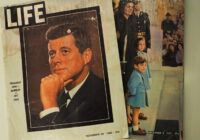Americans remember four spectacular and symbolic assassinations from the 1960s. That of President John F. Kennedy, shot in Dallas, Texas, on Friday, November 22, 1963, marks a moment of maximum trauma in modern US history. For three days, television channels ran with no advertising as the nation witnessed not just the sudden disappearance of a youthful president but the unfolding of a complex narrative of criminality that concluded with the shooting of Lee Harvey Oswald, Kennedy’s presumed killer, two days later.
The second high-profile assassination, of the radical black political activist, Malcolm X, in 1965, played out as a mere sideshow. The national media treated it essentially as a black-on-black killing or a settling of scores among marginal political extremists.
The third assassination, the gunning down of Reverend Martin Luther King Jr. in April 1968, shocked a nation already rattled by the JFK assassination and the Vietnam War. King was a black leader considered far more respectable than Malcolm X. The black community reacted with violence as riots broke out in several US cities.
The fourth assassination occurred two months later, when JFK’s brother, Senator Robert F. Kennedy, was fatally wounded by a Palestinian immigrant, Sirhan Bishara Sirhan, following his victory in the California primary. Most people expected him to win that year’s November presidential election. His death induced a shocked sense of utter dismay across the nation.
The media have consistently demonstrated their patriotic discipline with regard to all of these assassinations. They shied away from looking seriously into the obvious anomalies in all of them. They have ever since blocked the preponderant evidence of foul play, particularly by the CIA and FBI, on the grounds that simple coherent alternative narratives of the events have never been credibly established. Future historians will undoubtedly admire the dexterity of those who had good reason to prevent alternative accounts from coming. In deference to the authorities, the dominant media consistently either ignored or discredited any narrative other than the official version.
Divide and Rule: What Drives Anti-Asian Resentment in America?
As time goes by, the patterns have become clearer. But that hasn’t changed the dominant narrative in the media. Evidence that others were involved in the RFK assassination, for example, was available at the time of the investigation but wilfully ignored or obliterated. One victim of the shooting, Paul Schrade, insists today that the killer could not have been Sirhan Sirhan, who was duly tried and convicted. The King assassination contains a similar level of contradictory evidence, including the testimony of the man tried for the crime. The documented motives of J. Edgar Hoover, who ran the FBI as his feudal domain, should have been obvious enough to make him the number one suspect instead of James Earl Ray.
In other words, anyone with a sense of the repetitive mechanics of political history should suspect that some form of concerted operation involving vested interests, including government officials, was at work in those three high-profile assassinations. That suspicion alone fails to justify any particular theory of who the actors were and how they may have executed their plan. It simply acknowledges a strong likelihood of collusion and recognizes the very real capacity those interests have for obfuscation. The case of Malcolm X until this week seemed to be the outlier, easily explainable through Malcolm’s rejection of Elijah Muhammad’s Nation of Islam movement. For the first time, we have highly credible evidence of the FBI’s role in the deed. It has been reported by Reuters, the BBC and others.
The evidence is the confession that New York City Police Department Officer Raymond Wood accepted to be revealed only after his death. He explains how the FBI and the NYPD set up Malcolm X’s assassination: “Raymond Wood’s letter stated that he had been pressured by his NYPD supervisors to lure two members of Malcolm X’s security detail into committing crimes that resulted in their arrest just days before the fatal shooting.”
Today’s Daily Devil’s Dictionary definition:
Pressured:
Induced in such a way that what amounts to an order that must be executed can be interpreted as a mere incitement.
Contextual Note
In the case of the JFK assassination, numerous people in a position to know and possibly reveal the truth were conveniently eliminated or silenced, allowing the official version of the events to take precedence over any alternative interpretation. Lee Harvey Oswald was of course the first to disappear, gunned down in the Dallas police station by Jack Ruby. Guy Bannister, Mary Meyer and Dorothy Kilgallen were others on a long list.
None of these disappearances prove anything. They could be mere coincidences. But they point to a pattern not inconsistent with the documented policy of the CIA at the time that listed assassination as one of its tools in covert operations. Mary Meyer was the ex-wife of CIA operative Cord Meyer, who headed the Covert Action Staff of the Directorate of Plans from 1962. He had also been in charge of the notorious Operation Mockingbird that allowed the CIA to control the narrative of American media. Mary Meyer was also Kennedy’s paramour. She was the victim of an unsolved murder in 1964. Kilgallen had interviewed Jack Ruby in 1964. Shortly before her death (“apparent suicide”), she “told acquaintances she had a ‘great scoop’ that would ‘blow the JFK case sky high.’”
The standard reasoning to defend the official accounts of assassinations was expressed by Bruce Miroglio, a lawyer cited by the BBC: “The number of people that would be involved in the cover-up is so vast, it seems almost impossible they would keep anything earth-shattering under wraps.” Miroglio obviously knows little about either organizational psychology in general or government secrecy in particular. Why have liberal presidents such as Barack Obama gone to such extremes to send whistleblowers to prison? Concern for one’s survival and well-being can incite close to 100% of the population not only to keep a secret but to accept passive complicity.
As the BBC reports this week, the posthumous testimony of New York policeman Raymond Wood contains the allegation “that he was tasked with making sure that Malcolm X would have no door security in the building where he was due to speak in public.” Wood’s family affirms that “he did not want to make the letter public until after his death, fearing repercussions from the authorities.” As any mafioso knows, repercussions sometimes happen.
Historical Note
A month after the JFK assassination, President Harry Truman authored an op-ed in The Washington Post denouncing the fact that the “CIA has been diverted from its original assignment.” He singled out its newfound predilection for “peacetime cloak and dagger operations.” In 1953, the first year of the Eisenhower presidency, the CIA drafted a document that was only made public in 1997: “A Study of Assassination.” The director of the CIA was Allen Dulles, appointed by Truman. Dulles was the man John Kennedy fired after the Bay of Pigs fiasco in 1961. Eisenhower appointed John Foster Dulles, Allen’s brother, as secretary of state.
Those two brothers literally ruled the world specializing in a wide range of skulduggery that typically included regime change. The overthrow of the democratically elected Iranian prime minister, Mohammad Mossadegh, and President Jacobo Arbenz of Guatemala were two spectacular cases conducted in that same year, 1953.
J. Edgar Hoover’s FBI had perhaps provided the example the Dulles’s post-Truman CIA decided to emulate. Hoover had effectively turned the FBI into the equivalent of a government terrorist outfit, using its legitimate activity that consisted of investigating federal crimes as cover for repressive acts with highly political ends. It is worth noting that the “I” in FBI stands for “investigation.” The “I” in CIA stands for “intelligence.” Investigation is the normal activity of any law enforcement organization. Hoover, of course, pushed it further.
Truman should never have called the CIA an “intelligence” organization. The French translation of intelligence is simply “renseignement,” which means gathering “factual information.” That was what Truman was expecting — the delivery of information to inform the executive’s decision-making about policy. The idea that it was “intelligence” may have gone to the head of CIA directors.
In the 1950s, Hoover and the Dulles brothers shaped a world in which political intellect was transferred from democraticly elected officials to organizations that encouraged the mentality of a police state. Since then, technology has simply added to their power.
*[In the age of Oscar Wilde and Mark Twain, another American wit, the journalist Ambrose Bierce, produced a series of satirical definitions of commonly used terms, throwing light on their hidden meanings in real discourse. Bierce eventually collected and published them as a book, The Devil’s Dictionary, in 1911. We have shamelessly appropriated his title in the interest of continuing his wholesome pedagogical effort to enlighten generations of readers of the news. Read more of The Daily Devil’s Dictionary on Fair Observer.]
The views expressed in this article are the author’s own and do not necessarily reflect Fair Observer’s editorial policy.
Support Fair Observer
We rely on your support for our independence, diversity and quality.
For more than 10 years, Fair Observer has been free, fair and independent. No billionaire owns us, no advertisers control us. We are a reader-supported nonprofit. Unlike many other publications, we keep our content free for readers regardless of where they live or whether they can afford to pay. We have no paywalls and no ads.
In the post-truth era of fake news, echo chambers and filter bubbles, we publish a plurality of perspectives from around the world. Anyone can publish with us, but everyone goes through a rigorous editorial process. So, you get fact-checked, well-reasoned content instead of noise.
We publish 2,500+ voices from 90+ countries. We also conduct education and training programs
on subjects ranging from digital media and journalism to writing and critical thinking. This
doesn’t come cheap. Servers, editors, trainers and web developers cost
money.
Please consider supporting us on a regular basis as a recurring donor or a
sustaining member.
Will you support FO’s journalism?
We rely on your support for our independence, diversity and quality.






